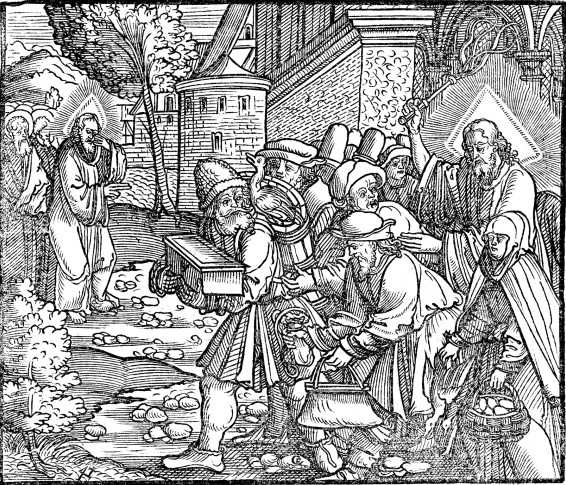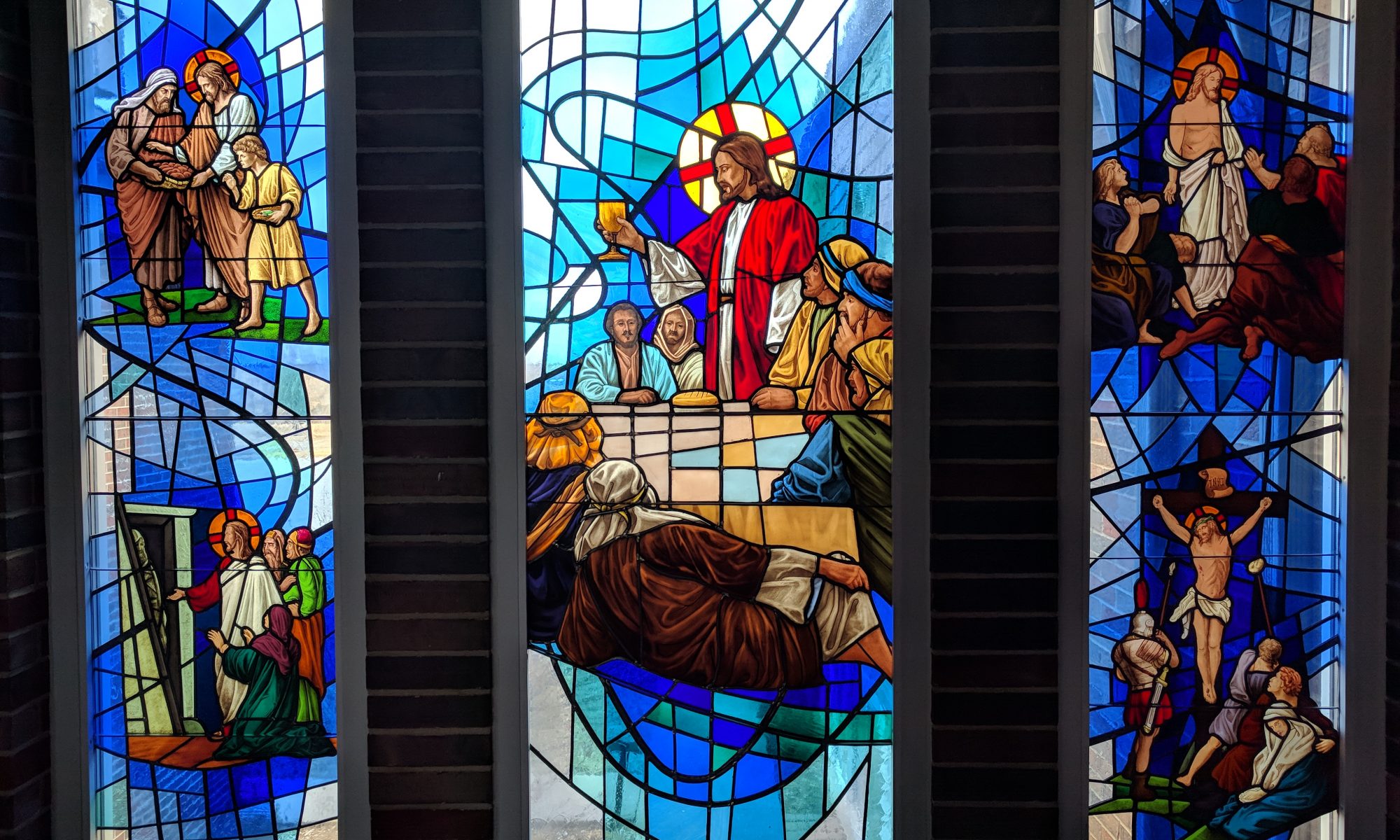
Lessons: Jeremiah 7:1-11, Romans 9:30-10:4, Luke 19:41-48
Hymns: LSB 901, 585, 644, 642, 693
Grace, mercy, and peace to you from God our Father and our Lord and Savior, Jesus Christ.
There are only two occurrences recorded in the Gospels in which Jesus weeps. Both occasions are quite close to each other. Not long before Holy Week, Jesus received word from Mary and Martha that their brother, Lazarus, was ill at their home in Bethany. Jesus stayed where He was for two days before heading to see them. By the time Jesus arrived, Lazarus had been dead for four days. Martha said to Jesus, “Lord if you had been here, my brother would not have died.” Jesus replied, “Your brother will rise again.” Martha knew Lazarus would rise again in the Resurrection on the Last Day. Jesus declared, “I am the Resurrection and the Life. Whoever believes in Me, though he die, yet shall he live, and everyone who lives and believes in Me shall never die.” Jesus went to the place where Lazarus laid, and many were weeping. Jesus wept. Then Jesus raised Lazarus from the dead by speaking these simple words: “Lazarus, come out.” (John 11:1-44)
This account provides much comfort for us Christians. We can see the power Jesus has over death and the grave. We can also see our Lord’s compassion and humanity as He weeps. Jesus can turn our tears of sorrow into tears of gladness.
The second time Jesus weeps is in today’s Gospel. A time a joy was turned into a time of sadness. It was Palm Sunday, and He rode on a donkey into Jerusalem as the crowd joyously sang Hosanna. And suddenly Jesus weeps over the city, saying “Would that you, even you, had known on this day the things that make for your peace!”
Imagine being among that crowd, hearing these words. I’m sure some were perplexed, wondering what could He possibly mean. Don’t they have the things that make for their peace? Don’t they have the Scriptures that were written for their learning? Don’t they have the Temple which was needed for worship in those days? Don’t they have a loyal and dedicated priesthood? Don’t they have the Scribes who keep on copying the Scriptures so many could have access to them?
Why, then, did Jesus announce that they did not have the things that make for their peace? I think at this point it is helpful to make a distinction between a comfortable church and a comforted church.
A comfortable church will seem like a great church. The attendance numbers are good. The budget is met. The people are happy. It’s attended by mostly middle- and upper-class citizens. The comfortable church reads the Bible, but probably doesn’t get into those details that may cause division. It’s the place where all the good memories are made—Baptisms and weddings, along with beautiful celebrations of our Lord’s birth and resurrection. Not much is required of the people in comfortable churches, for those churches have an administrative staff that takes care of pretty much everything. That way people can show up, enjoy themselves, and go home.
How we long to have a church like this. No worries. No pushing ourselves. No sacrifices of our time, talents, or treasures.
But what the comfortable church usually lacks is true comfort. It may enjoy many worldly comforts, but not the comfort that comes from above. For the comforted church relies on the mercies of God, trusting in Him above all things. The focal point is Christ and Him crucified and risen for the forgiveness of sins. The comforted church lives by every word that proceeds from the mouth of God—that is, the Scriptures are the sole source and norm of any legitimate Christian teaching. The comforted church faces hardship, but knows Christ is the Head of the Church and will bring us through all cross and trial. The comforted church hears the uncomfortable Law—and desires to abide by it. We in the comforted church will be terrified of our sin, confess our sin, and cling to Christ Jesus who cancels out our sin. Our consciences are comforted by the Gospel. We claim Christ as our Advocate and Defender. He replaces our sin with His righteousness.
Jeremiah was sent by God to preach Christ and bring this comfort to God’s people, but most Jews rejected Jeremiah’ ministry and wanted a comfortable church instead. They figured they could stray slightly and all would be good—that no hardship would come upon them. They thought it was safe to adopt the gods and false worship practices of their pagan neighbors. Over a century earlier, God said, “My people are destroyed for lack of knowledge” (Hosea 4:6).
1. You see, the comfortable do not see the danger of their being unaware of the truth. Many want to transform Lutheran churches into comfortable churches like these. They want our churches to depart from God’s Word and ordain anyone into the ministry, commune anyone regardless of belief, and ignore immorality. This is appealing to many people, for they want to be comfortable in their ignorance of divine truth. But when some portions of Scripture are replaced with lies, then God’s people live in confusion, and they are ultimately robbed of the Gospel—the very thing that makes for their peace.
Jeremiah lamented that God’s house had become a den of robbers. Yes, the holy sanctuary had become their den. If you think about it, a den is a home mainly for flesh-eating animals, including foxes, bears, bobcats, and raccoons. These animals leave their safe havens—their dens—to go out and devour. Liars, who hurt other people with their smooth speech and comfortable-sounding lies, made the Temple their home and went out devouring others. They led God’s chosen people to believe that they may believe what they want, do what they want, and live how they want—as if God had no say over His people. While they thought this would make them comfortable, they were running after other gods to their hurt.
And, of course, they are not comforted. Their homes were destroyed, and they were deported to foreign lands—just as God warned through the many prophets He raised up. And now on Palm Sunday, Jesus weeps over Jerusalem, predicting that the same thing will happen to them again. King Herod knew how to keep them comfortable. He spoiled the Jews with a grand Temple. Its construction with all the courtyards and additions took decades. The people loved it. Despite their anxiety being ruled by foreigners, they were still very comfortable. And the leaven of the Scribes and Pharisees increased their notion of being comfortable.
2. The comfortable do not see the danger of their love of mammon. Last week, we heard Jesus teach, “You cannot serve God and mammon” (Luke 16:13). They have made God’s house a den of thieves. Those who were too poor to bring a lamb for a sacrifice could bring a pair of turtle doves or pigeons—birds that they could catch. But instead, there were people selling these birds for top dollar, trying to make as much as they could off the poor. They did not use God’s house as a place for mercy, but as a place to advance themselves.
So Jesus weeps. They had rejected the promised Messiah. They were about to sentence Jesus to death. They did not know what truly made for their peace, nor did they know the time of their visitation. Our Lord’s prophecy is fulfilled 40 years later when Jerusalem is destroyed by the Romans, and the Temple is leveled.
3. The comfortable do not see the danger in being unprepared. In Jeremiah’s day, the Jews were unprepared when foreign nations rose up against them. In Jesus’ day, He said they did not know the time of their visitation. They were unprepared when Jesus came in mercy to reconcile them to their Father in Heaven. Their lack of knowledge and their love of mammon resulted in their being unprepared.
The comfortable today are also unprepared. They are not prepared to come to the Lord’s altar to feast on Him. They are not prepared, should their lives be required of them tonight. They are not prepared, should Jesus return today in glory. For they are comfortable in their sins, assuming Jesus will require it of them at a later time.
The comforted, however, are those who have been crushed by the weight of the Law. Their sins are before them, but they lay their sins of Jesus—the spotless Lamb of God—knowing that He will absolve them of their offenses and declare them righteous. As the comforted, we hear God’s accusations and become alarmed of our sin. We are not comfortable remaining in our sin. For we know “The wages of sin is death, but the free gift of God is eternal life in Christ Jesus our Lord” (Rom. 6:23). We are comforted because Jesus comes to us with the Gospel, forgiving us, loving us, and granting us His peace. We have the things that make for our peace—the pure Word, knowledge of the Son, the right administration of the sacraments, repentance, and faith.
As the comforted, we abide in God’s Word so that we know the truth and it sets us free (John 8:31-32). As the comforted, we do not seek solace in mammon but we seek peace through Christ, His Kingdom, and His righteousness. And, as the comforted, we are ready for the return of Jesus, praying, “Come quickly.”
Those in the comfortable church will weep when their earthly props give way and when they realize they have been led by lies. And even we will weep who enjoy God’s peace in the comforted church. For we will suffer hardship and persecution, give in to the impulses of our flesh and sin gravely, and endure the crosses of being Christ’s disciples. But we will continue to cling to Christ, who redeems us, has risen from the grave, and will bring us to Himself in Paradise.
Let’s praise God that we do not have the hallmarks of a comfortable church, but instead that we are a comforted church. Christ Jesus meets us with His mercy, pouring out His grace upon us lavishly. Despite whatever challenges come our way—whether in our daily lives or congregational life—we know that Christ is for us, He loves us, and He will be with us. He has a plan and purpose in all things. And so, we will hang on His words of life, peace, and comfort. Amen.
The peace of God which passes all understanding keep your hearts and minds in Christ Jesus to life everlasting. Amen

